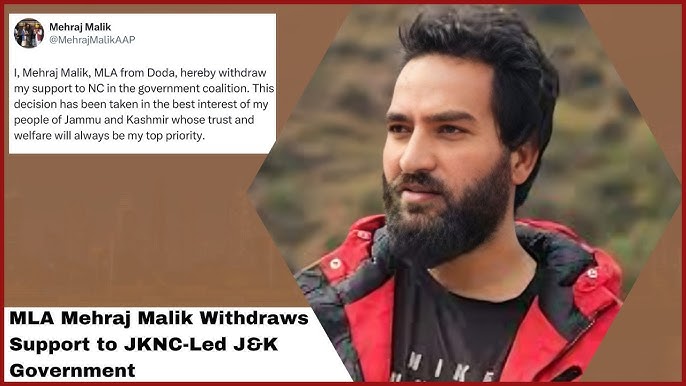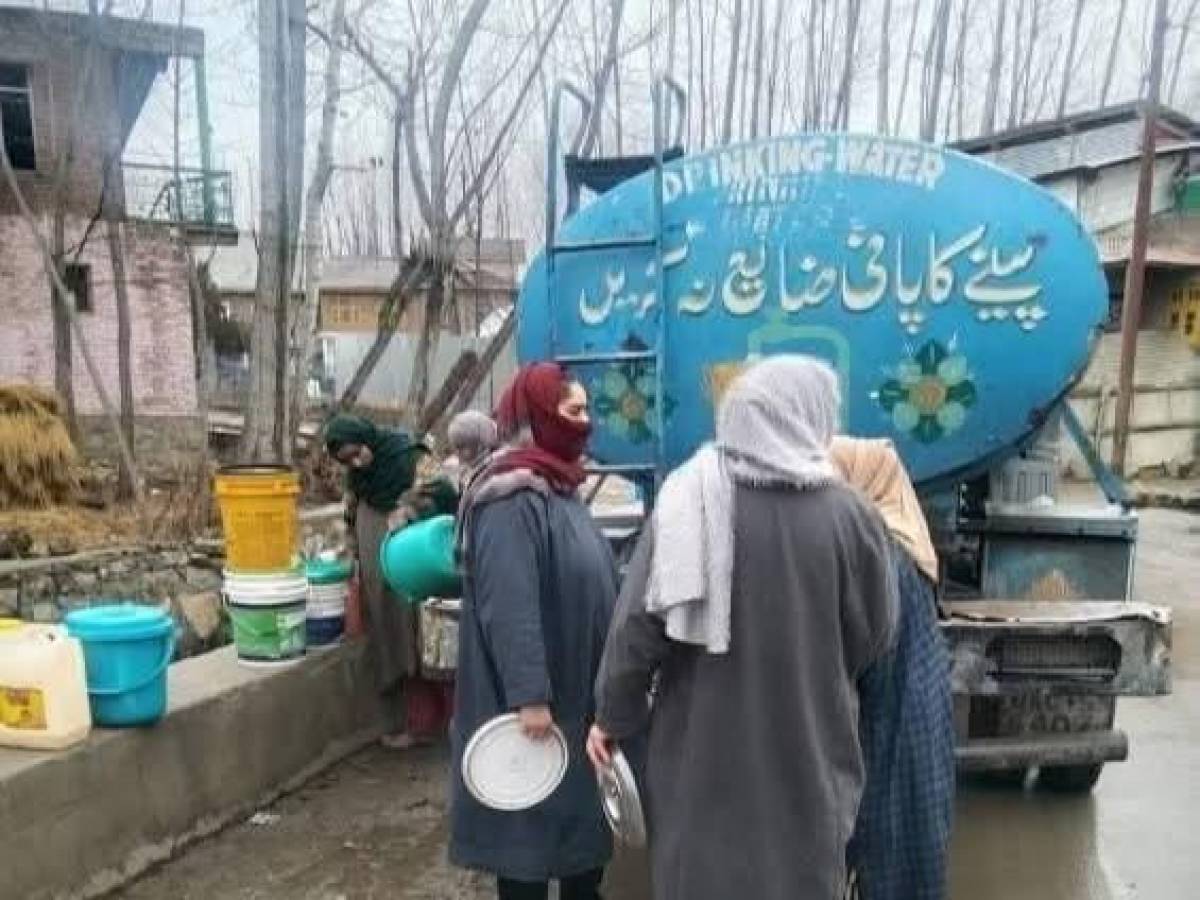Mehraj Malik Withdraws Support from NC-Congress Coalition in Jammu & Kashmir | AAP MLA Doda Political Twist
A Jolt to J&K’s Political Landscape
In a surprising turn that has sent ripples through Jammu & Kashmir’s political corridors, Mehraj Malik, the lone MLA of Aam Aadmi Party (AAP) from the Doda district, has officially withdrawn support from the National Conference (NC)-led coalition government.
Though the move may appear symbolic in numbers, it is anything but insignificant in impact. Malik’s announcement—made via social media—comes at a time when the NC-Congress alliance is navigating delicate issues of governance, transparency, and public discontent in a post-Article 370 Jammu & Kashmir. The decision has reignited debates over regional equity, minority representation, and the role of independent voices in the new political order.
The Announcement: “In the Best Interest of My People”
Taking to X (formerly Twitter), Mehraj Malik issued a concise but emotionally charged statement:
“This decision has been taken in the best interest of my people of Jammu and Kashmir, whose trust and welfare will always be my top priority.”
The language of his message was measured yet impactful, reflecting a mix of disillusionment, ideological dissent, and strategic recalibration.
This is not the first time Malik has made headlines for defying conventional norms. Known for his unapologetic tone and independent streak, Malik’s latest decision could signal deeper undercurrents of dissatisfaction with the functioning of the current administration.
Political Composition of J&K Assembly: Where Do Numbers Stand?
Let’s examine the arithmetic:
-
J&K Assembly Strength: 90 seats
-
Current NC-Congress alliance strength: 52 MLAs
-
BJP: 34 seats
-
Others (including AAP, independents): 4 seats
Though Malik’s withdrawal doesn’t threaten the numerical stability of the NC-Congress alliance, it introduces political volatility. The opposition—particularly the BJP—may capitalize on this to target the legitimacy and cohesion of the ruling coalition.
Who Is Mehraj Malik – The Maverick from Doda
AAP’s Lone Warrior in the Valley
Malik, an advocate by profession and activist by ideology, was elected from the Doda constituency in the 2024 Assembly polls, representing AAP’s maiden success in Jammu & Kashmir.
He quickly rose to prominence for:
-
His impassioned speeches in the Assembly
-
Blistering critiques of the BJP, PDP, and even NC ministers
-
Vocal advocacy for transparency, youth employment, and minority rights
Malik didn’t shy away from naming names or calling out inefficiencies, often drawing ire from ruling and opposition benches alike.
A History of Confrontations
His legislative record is peppered with:
-
Clashes with NC ministers over policy inconsistencies
-
Protests over government inaction in Doda and Chenab Valley
-
A notorious Assembly scuffle after a fiery exchange with a PDP member
His maverick behavior earned both praise from youth and criticism from mainstream parties, who often painted him as a “populist disruptor.”
What Led to the Fallout?
Underlying Frustrations with the NC-Led Coalition
Sources close to Malik cite a range of reasons behind his decision:
-
Broken promises on regional development, especially in Chenab Valley
-
Perceived centralization of power in Srinagar, with little autonomy for smaller districts
-
Alleged sidelining of non-NC legislators, especially independents and AAP
-
Poor delivery on employment and infrastructure promises
Malik has been especially critical of the lack of transparency in project allotments and the sluggish pace of decentralization, often questioning whether the government’s claims of inclusive governance are more rhetoric than reality.
The Chenab Valley Factor
The Chenab Valley region, which includes districts like Doda, Kishtwar, and Ramban, has long felt neglected in development schemes. Malik repeatedly raised the issue of:
-
Unequal distribution of funds
-
Delayed road and power projects
-
Poor health infrastructure
In Assembly sessions, he pointed out that Chenab is used as a vote bank but ignored in governance, calling it a “ghost region in J&K’s budget books.”
What This Means for the NC-Congress Government
Majority Still Intact—But Image Takes a Hit
The numerical strength of the NC-Congress alliance remains solid, but the political message this sends is damaging:
-
It raises questions about coalition discipline
-
It emboldens opposition narratives around inefficiency and alienation
-
It creates space for more MLAs to break ranks, especially those with grievances
In a coalition setup, optics are as important as numbers, and Malik’s public withdrawal could impact public perception, especially in semi-urban and rural areas of Jammu.
Policy Fallout and Legislative Hurdles
With Malik no longer backing the coalition, the government may face increased hurdles during legislative debates, especially on bills involving:
-
Regional development grants
-
Minority rights legislation
-
Panchayat-level empowerment
It may also encourage dissenting voices within Congress and NC who have so far stayed silent due to party discipline.
National Impact – AAP’s Kashmir Experiment on the Brink?
Is AAP Fading in the Valley?
Malik was AAP’s sole legislative presence in J&K, and his distancing from the ruling alliance may mark the beginning of the end for AAP’s foothold in the region—unless followed by a coherent strategy.
While AAP’s national image is built on anti-corruption and people-first governance, Malik’s exit from a “pro-people alliance” raises internal contradictions:
-
Is AAP capable of regional negotiations?
-
Can it build alliances while retaining its independence?
-
Will this push AAP closer to BJP, or will it isolate the party?
Public Response – The People of Doda Speak
Mixed Reactions on the Ground
Local reactions in Doda and the surrounding Chenab Valley are mixed:
-
Many youth praised Malik for “putting people before politics”
-
Some locals fear the move may isolate the constituency from state-level power centers
-
Business leaders worry that funds and projects may be delayed or redirected
Nonetheless, there is wide consensus that Malik remains deeply popular, especially among first-time voters and the unemployed youth.
Political Fallout – Opposition Gains, NC on the Backfoot
BJP’s Opportunity to Strike
BJP leaders have already begun using Malik’s exit to:
-
Accuse NC of centralized and dynastic control
-
Underscore AAP’s disillusionment with the so-called “secular” alliance
-
Push for fresh elections or a floor test, although the numbers don’t warrant it yet
Congress Stays Cautiously Silent
Congress, which shares power in the coalition, has maintained a low profile since Malik’s announcement—perhaps recognizing that internal dissent is just as likely in their own ranks.
If Congress tries to discipline Malik or challenge his narrative, it may backfire in Jammu, where anti-NC sentiment remains high.
What’s Next – Will Others Follow?
Possible Domino Effect?
Malik’s move could embolden:
-
Independent MLAs who’ve grown disillusioned
-
Congress legislators from Jammu, long overshadowed by Srinagar-based leadership
-
Grassroots party workers, who feel their concerns are ignored in favor of political arithmetic
Political observers suggest another MLA from the Udhampur-Reasi belt may be considering withdrawal, especially over lack of funding for public health and tourism development.
Snap Polls or Status Quo?
While Malik’s exit doesn’t immediately affect the NC-Congress government’s survival, it does accelerate speculation around mid-term corrections or even snap polls, particularly if more dissent surfaces.
The LG administration’s role, especially that of Manoj Sinha, will also be closely watched. Will the Raj Bhavan call for floor strength revalidation in the coming Assembly session? Or will it let political tension simmer until it hits a boiling point?
Conclusion: The Lone Voice That Roared
Mehraj Malik’s withdrawal of support might not topple a government, but it has toppled the illusion of coalition harmony in Jammu & Kashmir.
His move is a wake-up call for the NC-Congress coalition to introspect—on governance, representation, and equity. It’s also a moment of reckoning for AAP: Can it adapt and grow in the politically complex terrain of Kashmir, or will its experiment fade like a slogan?
In Malik, J&K may have found a rare voice of political defiance—unpredictable, passionate, and unapologetically loyal to the people who elected him. What remains to be seen is whether his solo act inspires a larger chorus or remains an isolated protest in an increasingly divided Assembly.



